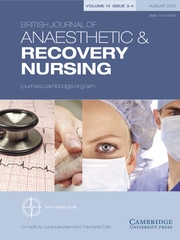In the present climate within the NHS, opportunities are limited for nurses to share good practice. This may be due to funding, pressures of work and accessibility. It is important for training to continue, for if skill level falls, it will have a huge impact on patient care.
York is a beautiful city, is easily accessible and has excellent facilities in which to hold an in-house study day. The York Hospital NHS Trust boasts a wealth of expertise so the staff here in the Post Anaesthetic Care Unit felt this was an excellent opportunity to host a day of study. I was inspired by an article written by Williamson (2004) who stated ‘Nurse-led events are a great way to share practice and network but arranging one is a rewarding experience in itself’.
By organising this we could share practice with other multidisciplinary professionals involved in patient care and from a wider geographical field. This would not only allow staff to share clinical expertise but also enable them to network and improve communication in clinical areas where patients are cared for pre- and postoperatively.
We ran a full programme during the day, which consisted of crucial elements to postoperative recovery and consisted of oxygen therapy, delivery and nebulisation; Black and Blue in PACU (airway difficulties); several workshops on the difficult airway; managing haemorrhage and anaemia without blood transfusion; haemodynamic optimisation; recognising a deteriorating patient; and pain management in the surgical patient. These were delivered via lively skills workshops, demonstrations, lectures and display boards were an added interest.
We had an excellent day (probably the hottest day of the year so far, which gave us some problems of keeping our delegates cool!), a full house with 60 delegates and super catering. Our thanks must go to the speakers Dr Richard Grummitt, Dr George Priestley and Dr Jonathon Wilson, all Consultant Anaesthetists here at York. Ian Wilson, the Resuscitation Officer and Debbie Hunter, Acute Pain Nurse Specialist, also from York and Mr Richard Carter who joined us from the Hospital Liaison Committee for Jehovah's Witnesses, Leeds, who all gave freely of their time and delivered with such enthusiasm and entertainment.
As this was our first attempt at hosting a study day we are both encouraged and motivated by the excellent feedback we have received from the delegates, who arrived from Scarborough, Scunthorpe, Hull, Bradford, Doncaster, Bassetlaw and of course York itself. Most of these delegates specified that they would welcome more of these days and for all those interested in organising one in their Trusts, I would say ‘go for it’.
This day was financially supported by generous sponsorship from BARNA, Intersurgical, Summit Medical, Daniels and Bristol Myers Squibb to whom we express our grateful thanks. It was great to be part of such enthusiasm and thirst for knowledge, in such times when we read articles in our nursing press which state that ‘money for training will be scarce for the foreseeable future’.
For further information on this study day or organising a Study day please contact Pauline.Guyan@York. NHS. UK




